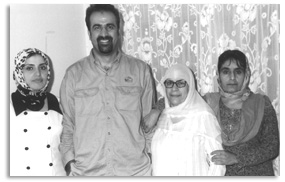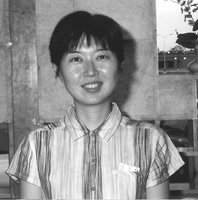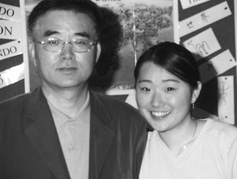A sampler of ELI students
Each student who enters the ELI classroom brings a unique story, some of which may reflect world events as well as individual aspirations. Below is a sampler of three ELI stories from 2003.
A family matter
Fazal Ansari considers himself a lucky man.
 |
|
Fazal Ansari with his wife Soma (left), mother Zalaikha, and sister Hadia |
Eight years ago someone threw a grenade into his family home in Kabul. The next day, the entire family fled to Pakistan. On the way, Ansari, who was driving the car, was shot in the head. It took several operations during his seven-year exile in Pakistan to restore his sight.
In 1997, the family’s prospects began to brighten when Ansari’s older sister, Aiysha, won the visa lottery to come to the United States. A doctor, she would have to pass a tough exam in order to practice medicine here.
At first, however, Aiysha had to earn money. While working at Macy’s in Christiana Mall, she met Linda Sayther. Touched by Aiysha’s story, Sayther and her husband, Paul, a pilot for MBNA, offered her a room in their house.
For two years, Aiysha worked to save enough money to take the medical exam. Today she is a resident at Johns Hopkins Hospital in Baltimore.
In 2002, Aiysha sponsored Fazal, his wife and three children, sisters and mother to the United States. They stayed with the Saythers for a month. Then the family moved into a house on Cheltenham Road in Newark which the Saythers subsidized until they could get financially established.
"They helped us a lot," said Ansari, gratefully.
Ansari, 29, started studying at ELI in May. In September he was joined by his sister Hadia, a doctor, who took the TOEFL preparation class; his wife Soma, a pharmacist, who signed up for the evening class; and his mother Zailakha, a teacher, who enrolled in the morning program.
Between classes, Ansari was busy launching an import-export business similar to the one his family ran back home. The company will import carpets and export cars and medicine to Afghanistan. The business will involve frequent travel to Afghanistan, but Ansari plans to continue living in the United States.
"Here there is peace, security and freedom," he said. "And there are jobs."
 |
|
Saihanjuna |
Seeking diversity
Following the tradition of her Mongolian ancestors, Saihanjuna has just one
name, which at ELI she shortened to "Juna." Besides that, however, nothing
much else in Juna’s life seems simple. In fact, one could say the 31-year-old
doctoral student thrives on complexity and diversity.
That trait–which helped Juna feel immediately at home when she arrived at ELI in March–has a lot to do with her background.
Born in Beijing, China, Juna grew up on the campus of the Central University for Nationalities, where her father was a professor of Mongolian literature and history. Professors from about 50 different ethnic groups lived in her neighborhood. Juna reveled in the cultural variety, but, like her father, she especially enjoyed Mongolian traditions.
She recalls fondly the traditional milk tea and noodles for the morning meal, and the mutton which relatives from Inner Mongolia used to send to her family in winter. Each spring, she said, Mongolians from all over Beijing gather for the Nadam festival, which dates from the days of Genghis Khan and includes archery contests, sumostyle wrestling and much singing and dancing.
After graduating in public administration from Beijing University, Juna worked with the Beijing Ethnicity Affairs Committee, serving over 400,000 ethnic minorities in the capital city.
When her father took a position with Waseda University in Japan, Juna flew over for a visit. She liked Japan so much she stayed, learned the language and eventually became a graduate student in sociology at Nagoya University.
For her master’s thesis she researched intermarriage– choosing 45 Chinese and Japanese couples as her subjects.Whatever she discovered must have been positive, because Juna herself married Shin Miyazaki, a Japanese citizen, in 2000.
Currently Juna is pursuing her research on intermarriage for her doctorate and wants to include a sample group from both China and the United States.Whether the future will find her working for UNICEF or teaching at a university is unclear. But one definite goal is to found an orphanage in her ancestral home, Mongolia.
"It’s difficult to realize your dreams," she said. "I’m doing it step by step."
Like father, like daughter
Su-Hyang and Jang-Geun Lim have a lot in common. She’s invariably cheerful.
He’s an inveterate optimist. But for eight weeks in March and April they shared
more than usual when the pair became the Institute’s first father-daughter
duo.
The elder Lim, 45, an economist with the Korean Ocean Research and Development Institute, was beginning six months as a visiting scholar with the University of Delaware’s Center for Energy and Environmental Policy. Daughter Su-Hyang, 18, chose to accompany her father before beginning studies in business management at Inha University near Seoul in the fall.
 |
|
Jang-Geun and Su-Hyang Lim
|
Every day the two traveled to ELI classes together from their apartment in English Village outside Newark. They went to the library together, listened to English tapes together and studied with each other. Jang-Geun had stronger reading and writing skills. Su-Hyang was better at oral communication.
"We could help each other," said Su-Hyang. "We could correct each other."
Sometimes the pair’s shared experience brought some surprises.When her father invited some of his classmates home, Su-Hyang discovered that his friends were also hers.
"That’s an impossible thing in Korea," she said.
While Su-Hyang continued at ELI for four more months and graduated with honors, after one eight-week session her father devoted himself fulltime to his research into U.S. ocean energy and environmental policy. The economist hopes to apply American-style project planning, management and evaluation techniques to the Korean setting.